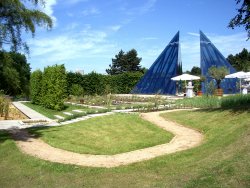
Affiliation:
University of Hamburg /
Dryland Research Centre Hamburg (DRCH)
Mailing address:
Dryland Research Centre Hamburg (DRCH)
Biocentre Klein Flottbek and Botanical Garden
Ohnhorststr. 18
22609 Hamburg
German
Mission statement
The Dryland Research Centre Hamburg (DRCH) identifies pressing problems with regard to safeguarding natural dryland resources and the sustainable utilisation of their goods and services. DRCH strengthens links with international research partners for innovative and interdisciplinary research for the sustainable development of drylands.
The environment of the location
The Dryland Research Centre Hamburg is located in the Free and Hanseatic City of Hamburg in northern Germany. Hamburg is the second largest city in Germany and has the ninth-largest port in the world. The city is renowned for its long global trade also with dryland regions. Based on this historic background, the city provides a very vital, multi-cultural and globally well-linked economic and scientific community.
Short profile of the Dryland Research Centre Hamburg
The Dryland Research Centre Hamburg (DRCH) is an interdisciplinary research network and coordination centre of research institutes at the University of Hamburg and other regional research institutions, rooted within the strategy plans of the University of Hamburg and the Faculty of Natural Sciences. Its main focus is placed on pure and applied dryland research as a contribution to the international and national efforts on earth system and global change research. The DRCH coordinates the implementation and scientific steering of dryland research projects related to the UN Conventions to Combat Desertification (CCD), Biodiversity (CBD) and the Framework Convention on Climate Change (FCCC).
The Dryland Research Centre Hamburg organises and provides the platform for e.g.
- Identification, analysis and formulation of key research questions with regard to pure and applied research
- Coordinating existing dryland research projects that are carried out by the relevant institutions in Hamburg, Germany
- Acquiring, initiating and coordinating further research projects
- Cooperating closely and continuously with other scientific institutions in Germany, the European Union and worldwide
- Facilitating and encouraging the cooperation with relevant institutions in dryland areas
- Executing and supporting fieldwork and maintaining local research facilities
- Providing a platform for knowledge management, information exchange and networking
- Delivering certificates, surveys and scientific advice for projects carried out by the development cooperation
- Consulting (NGOs, development cooperation, research institutes)
- Public Relations, providing information for the media and delivering topical statements
- Organising events (workshops) to discuss current issues in dryland research
Structure
The Dryland Research Centre Hamburg constitutes 5 research institutes which cooperate on dryland issues. The network links aspects on biodiversity, soils, climate, social-sciences, desertification, remote sensing and GIS to achieve an interdisciplinary foundation for developing proposals for sustainable dryland development. The institutions of DRCH are well represented in the European DesertNet (EDN), a network for global Desertification Research (http://www.european-desertnet.eu) which is being coordinated at Hamburg and already has over 290 members from 48 countries.
Member Institutes of DRCH
- Biocentre Klein Flottbek and Botanical Garden
University of Hamburg
Ohnhorststr. 18
D-22609 Hamburg, GermanyTopics: botany, vegetation ecology, monitoring vegetation changes, rangeland management and restoration, desertification, political science, non-academic capacity development, information communication networking - Institute for Geography
University of Hamburg
Bundesstr. 55
D-20146 Hamburg, GermanyTopics: biogeography, vegetation & landscape ecology, mountain ecosystems, man-environment-relationships, environmental degradation, nature conservation, social geography, risk assessment, remote sensing, climate modelling - MPI – Max-Planck-Institute for Meteorology
Bundesstr. 55
D-20146 Hamburg, GermanyTopics: Climate change research, climate modelling, terrestrial hydrology, aerosol, chemistry and climate - Institute of Soil Science
University of Hamburg
Allende-Platz 2
D-20146 Hamburg, GermanyTopics: Soil physics and soil chemistry, soil survey and soil quality assessment, remote sensing of soils, pedodiversity, internat. soil classification - Institute of Social Anthropology
University of Hamburg
Rothenbaumchaussee 67/69
D-20148 Hamburg, GermanyTopics: Demography, Local to international regulation institutions - Biocentre Grindel
University of Hamburg
Martin-Luther-King Platz 3
D-20146 Hamburg, GermanyTopics: zoology, animal ecology, conservation
Supporting facilities
- Biodiversity Observation Data Facility
- Herbarium Hamburgense
- Standardised Biodiveristy Observation Network in Africa (www.biota-africa.org)

